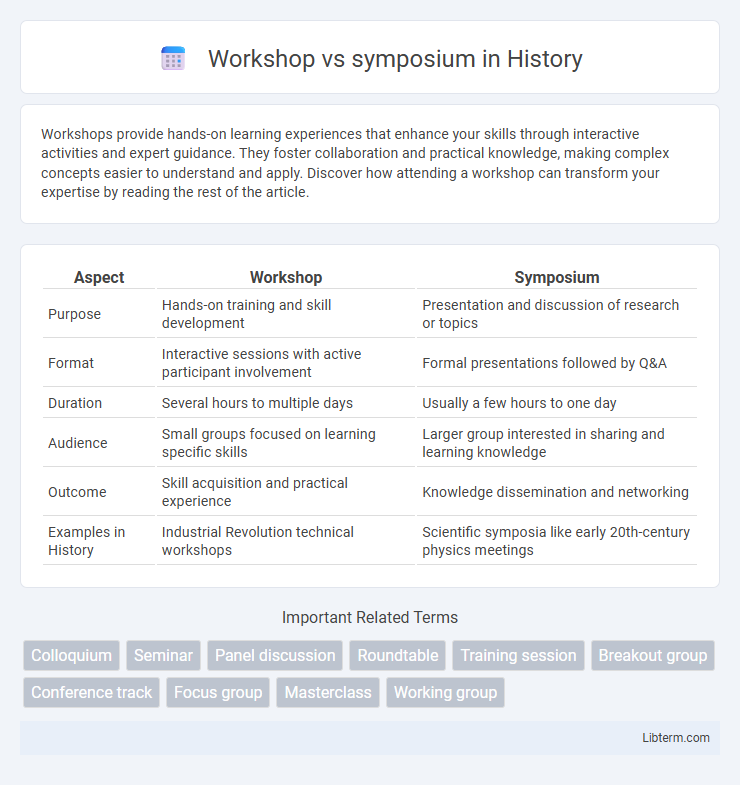Workshops provide hands-on learning experiences that enhance your skills through interactive activities and expert guidance. They foster collaboration and practical knowledge, making complex concepts easier to understand and apply. Discover how attending a workshop can transform your expertise by reading the rest of the article.
Table of Comparison
| Aspect | Workshop | Symposium |
|---|---|---|
| Purpose | Hands-on training and skill development | Presentation and discussion of research or topics |
| Format | Interactive sessions with active participant involvement | Formal presentations followed by Q&A |
| Duration | Several hours to multiple days | Usually a few hours to one day |
| Audience | Small groups focused on learning specific skills | Larger group interested in sharing and learning knowledge |
| Outcome | Skill acquisition and practical experience | Knowledge dissemination and networking |
| Examples in History | Industrial Revolution technical workshops | Scientific symposia like early 20th-century physics meetings |
Overview: Defining Workshops and Symposiums
Workshops are interactive sessions designed to provide hands-on experience and practical skills in a specific field, often involving group activities and direct participant engagement. Symposiums are academic or professional meetings focused on presenting research findings or expert discussions, typically featuring multiple speakers and a formal structure. Both formats facilitate knowledge exchange but differ in their approach, with workshops emphasizing learning through doing and symposiums prioritizing information dissemination and debate.
Key Objectives: Workshop vs Symposium
Workshops emphasize hands-on training and skill development through interactive sessions, aiming to enhance practical knowledge and participant engagement. Symposiums focus on the presentation and discussion of research findings or expert insights, promoting academic exchange and idea sharing. The key objective of a workshop is experiential learning, while a symposium prioritizes knowledge dissemination and scholarly dialogue.
Structure and Format Differences
Workshops emphasize interactive participation and hands-on activities, typically structured around practical exercises and group discussions to enhance skill development. Symposiums are organized as formal presentations or lectures by experts, focusing on sharing research findings and theoretical knowledge in a sequential format. Workshops often span shorter periods with smaller groups, whereas symposiums may involve multiple sessions and larger audiences within academic or professional conferences.
Participant Roles and Engagement
In workshops, participants actively collaborate through hands-on activities, discussions, and problem-solving exercises, fostering direct engagement and skill development. Symposiums typically feature experts presenting their research or findings to a passive audience, with limited interaction focused mainly on Q&A sessions. The role of participants in workshops is participatory and experiential, while in symposiums it is predominantly observational and receptive.
Duration and Scheduling
Workshops typically span several hours to multiple days, allowing for hands-on activities and interactive participation, often scheduled as focused sessions within conferences or as standalone events. Symposiums generally last from half a day to a full day, structured around a series of presentations or lectures on a specific topic, with less emphasis on participant interaction. Scheduling for workshops requires allocating sufficient time for practice and discussion, while symposiums prioritize time for multiple speakers and moderated Q&A sessions.
Content Delivery Methods
Workshops utilize interactive, hands-on activities to facilitate active participant engagement and skill development, often involving group exercises, demonstrations, and real-time feedback. Symposiums primarily feature structured presentations and expert lectures focused on disseminating research findings or theoretical knowledge to an audience with limited participant interaction. The content delivery in workshops is experiential and collaborative, whereas symposiums emphasize formal, lecture-based communication.
Ideal Topics for Workshops and Symposiums
Workshops are ideal for hands-on, skill-based topics such as software training, research methodologies, and technical skill development, allowing participants to engage actively and practice new techniques. Symposiums focus on broad, interdisciplinary themes like climate change, healthcare innovations, or educational reforms, where experts present research findings and engage in discussions to share knowledge. Choosing the appropriate format depends on the goal: workshops for practical application and symposiums for knowledge exchange and networking among specialists.
Benefits and Limitations of Each
Workshops offer hands-on experience and interactive learning, enhancing practical skills and immediate application, but may be limited by smaller participant capacity and narrower focus. Symposiums provide a platform for presenting diverse research and facilitating expert discussions, fostering knowledge exchange and networking, though they can be less engaging due to their often formal and lecture-style format. Both formats serve distinct educational purposes, with workshops emphasizing skill development and symposiums prioritizing academic discourse.
Choosing the Right Format for Your Event
Workshops offer hands-on, interactive learning experiences ideal for skill development, while symposiums focus on presenting research findings and facilitating academic discussions. Choosing the right format depends on your event goals: prioritize workshops for practitioner engagement and practical application, or symposiums for knowledge sharing among experts and fostering intellectual debate. Event planners should evaluate audience expectations, content complexity, and desired outcomes to ensure maximum impact and participant satisfaction.
Conclusion: Workshop or Symposium?
Choosing between a workshop and a symposium depends on the primary goal: workshops emphasize hands-on learning and skill development through interactive activities, while symposiums focus on sharing research findings and expert presentations. Workshops are ideal for participants seeking practical experience and active engagement, whereas symposiums suit those aiming to gain comprehensive knowledge and network within a specific academic or professional field. The decision ultimately hinges on whether the priority is experiential learning or information dissemination.
Workshop Infographic

 libterm.com
libterm.com